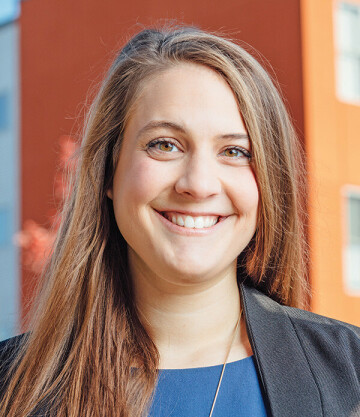FEELING STUCK? Here’s a Pep Talk from Some Young Professionals
soak in some wisdom from folks who been there and done that

What better way to learn the ropes of being a newbie adult than asking someone who just was one? We asked members of the Young Professionals of Chippewa Valley to bestow their wisdom upon the struggling 20-somethings in the Valley.

Eau Claire native Cory Knutson graduated from UW-Eau Claire in 2008 with a degree in Business Administration and a minor in Marketing. Knutson is currently employed at Huebsch Services in an IT role and owns several rental properties with this brother all around Eau Claire. Knutson also serves on the Advisory Board of Boys and Girls Club – Lee and Mary Markquart Center as well on the Leadership Circle Committee for United Way.

Emily Nyquist is a financial advisor and managing partner at Blue Granite Wealth in Eau Claire. She graduated from UW-Stevens Point, then in 2021, Nyquist and her business partner purchased Blue Granite Wealth. Nyquist serves on the boards of the Eau Claire County Humane Association and the Eau Claire Area Chamber of Commerce, in addition to her role as past-Chair of the Young Professionals of the Chippewa Valley.
Do you have any advice for someone looking to go into your field of work?
Knutson: Those looking to be well versed like I am (I often get confused with MacGyver) make sure to exploit your strengths and build on your weaknesses. I am constantly learning new things whether it’s related to work or a project at home. One of the biggest things is finding an employer that can recognize your value and push on your talents. You may find that your path changes a bit, but your happiness should stay the same or better!
Nyquist: I had an unconventional path to financial advising (to make a long story short: my degree is in biology, through a connection with my boss at a woodworking shop, I was offered an administrative role at my current company, then transitioned to advising and eventual ownership). If you consistently show that you’re dependable and willing to learn, you will have options. So one piece of advice is to explore opportunities, even if they don’t seem directly related to your past experience. There’s a lot of hands-on learning available in this job, so don’t think that you necessarily need a degree in a related field of study to be successful, although it might help you get your foot in the door. You do need to have the highest level of integrity, excellent people skills, a willingness to coach people who are often understandably anxious about their finances and/or investments, an appetite for career-long learning, attention to detail, and the ability to synthesize complex concepts and make them digestible to clients.
What was the hardest part when transitioning from college (if you attended) to your current job?
Knutson: The biggest thing from college to my current job is: I did not go to college for IT, so learning a bunch of terminology beyond whatever I would have used. I am told doohickey and thingamajig are not proper IT terms! I may completely understand how to do what someone is saying but the terms get tough and our communication can be off. I have learned not to be afraid to ask questions to clarify tasks better.
Nyquist: The lack of any clear definition of what success looks like. In school, for better or worse, your grades provide a clear indication of whether you’re hitting the mark. Hopefully, you and your supervisor can work together on goals for your position, and regular feedback/open communication will give you a sense of whether you’re on the same page as far as the quality and scope of your work. But no one told me this when I was first starting out! A lot of stress could have been avoided had I initiated conversations about my professional development early on with those in a position to help me.
Can you give any specific financial advice? People to turn to?
Knutson: When I graduated and started looking at the monthly payments of my student loans, I took the low payments option. Looking back I wish I would have taken the higher payments and shorter-term and adjusted my short-term spending to that. A couple of years ago I ended up switching it to a faster payoff to be done with it. I constantly tell interns and student groups this advice as it is better to hurt more in the pocket before you have kids than when you have kids!
Nyquist: There’s no one-size-fits-all approach to finance. But in general, investing early in life and consistently, even in smaller amounts, is a good start. If you don’t have a handle on your spending, make a budget and include long-term savings/investing in that budget. In many instances, investing involves a trade-off of shorter-term volatility risk for the expectation of higher longer-term returns. Know the risk in any investment/investment strategy you’re looking into, know what risk level is appropriate for your time horizon and risk tolerance, and make sure you’re willing to accept that risk before taking it on.
What’s the best advice someone older has given to you?
Knutson: My father and our mentors for as long as I can remember had always told us to buy rentals. I was about 30 when my brother and I acquired two properties. I am so happy we did it!
Nyquist: It’s OK to say, “I don’t know.” Early in your career, it’s tempting to combat imposter syndrome with overconfidence. This hinders your learning and can have disastrous results if you give incorrect/incomplete information. Rather than giving an immediate (but possibly incorrect) answer, try: “I’m not sure on that, but I’ll look into it and get back to you,” or “That’s not really my area but so-and-so should be able to help you” or “I haven’t been trained on that quite yet, can you show me?”
If you could go back to your 18-year-old self and give them one piece of advice, what would it be?
Knutson: Aside from telling myself about crypto? All jokes aside, I would have told myself to listen to my mentors a bit more and jump into the rental business sooner. It’s a business not suited for everyone but my brother and I make a great balance with the help of my wife (remember her patience too!) and we make it work. I would have also said to go to school for business and computer science.
Nyquist: Relationship-building, can 1) orient you in ways that your job alone can’t, and 2) enrich your life, both personal and professional. Many successful people will tell you they owe a lot of their success to luck – but networking puts you in a position to be lucky. The larger your network, the greater your chance of serendipitous “collisions” with people who can help advance your career, provide advice, and serve as a sounding board. I’m an introvert and still get jitters when in a big group of strangers – but like many other skills, networking gets easier the more you do it.

